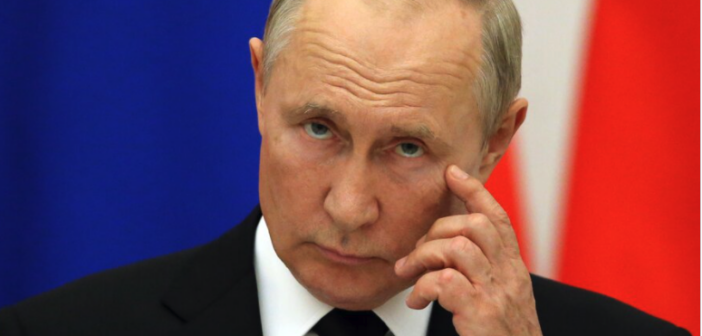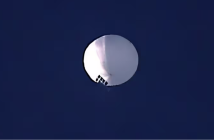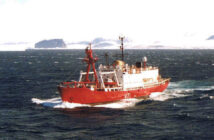President Biden and America’s allies deserve credit for their coordinated push back on Vladimir Putin’s violations of international law and imperial ambitions, collectively imposing real sanctions on Russia in the wake of the decision to invade its neighbor under false pretenses.
Russia’s sovereign wealth fund will no longer be able to operate on or raise capital on American and affiliated markets. VEB and another military bank — that constitutes half the nation’s banking capacity — have been sanctioned as have top leaders and their families. The EU and Britain imposed their own sanctions, and more importantly, Germany halted the Nordstream 2 gas pipeline project.
The moves rocked Russian markets and future actions include targeting Russia’s state bank, Putin himself as well as a long list of others, and Moscow’s access to technology.
The question is whether this time, as so often in the past, the international community’s bark will prove worse than its bite. That an unwillingness to pay a price, whether in trade, in defense investment or blood, will ultimately ensure a feeble reaction.
For too long, Washington and its allies have, as with China, lived in abject denial of reality because acknowledgment of the truth would mean action, and true action means costs and risks potential conflict. That tendency was wise during a Cold War with vast arsenals of thermonuclear weapons, but has devolved into talking for the sake of talking, explaining away threats, dismissing clear intentions as unclear, rationalizing inaction, do just enough to claim something was done, but not enough to incur cost. The West has consistently sought to get back to business as usual by punching so many holes in its own sanctions as to make them ineffective.
And it is that aversion to absorbing cost that has emboldened Putin who is expert at escalating so fast and high to compel his adversaries to back down. No action on his part, whether invading his neighbor, interfering in foreign elections and the domestic politics of sovereign nations, mounting attacks against his adversaries space assets and cyber networks, assassinating his opponents at home and aboard, targeting innocents in Syria, nothing has prompted sufficient action.
After his 2014 invasion of Crimea, as NATO leaders met in Wales to reaffirm their commitment to the inviolate nature of the alliance’s borders, Russian troops crossed that inviolable border to nab an Estonian intelligence officer from his home. Then Moscow captured a Lithuanian fishing boat and blocked Latvia’s prime rail link.
Russia’s space and cyber aggressions in particular have crossed all manner of red lines, but have gone unrevealed because doing so would force Washington to act.
And that is where deterrence has failed. Not because of one action, but a long string of weak half measures or missteps like the chaotic withdrawal from Afghanistan that suggested America is not ready for prime time. The aversion to paying a price has only ensured that everyone will now have to pay a far higher price in blood and treasure.
Despite the threat of unprecedented sanctions and endless rounds of diplomacy, Putin still invaded, demonstrating the limits of sanctions as a deterrent and of diplomacy.
In fact, the administration has complicated its own hand by taking military force and economic warfare off the table, and — in the midst of this crisis — adopting environmental policies that will make it harder for America to furnish Europe with the gas it needs once Putin severs energy supplies in response to US sanctions.
Russia and China not only see the West as lacking the will to stand up to incessant provocations, but also sense that America’s long-standing hard power advantages are declining. They recognize they increasingly have the ability to strike at range and in volume, including with hypersonic weapons, and that US forces neither have the ability to reach as far nor defend themselves from what may be coming their way.
As a consequence, Putin has continually adapted while stepping up his rhetoric, building capabilities he’s eager to demonstrate, and stockpiling $700 billion in cash, and forging an alliance with China to weather the coming storm he will unleash. He’s convinced he can absorb more temporary pain to permanently get what he wants — the recreation of the Soviet Empire dominated by Russia — than his adversaries are willing to bear in return.
China is now carefully watching how the world deals with Russia. If Moscow faces unprecedented punishment, and clear lines that the United States and its partners will turn on any nations violating those sanctions, then Beijing will understand that we are in a new era.
It’s time leaders who invited this crisis by their prolonged weakness to recognize that this is a historic inflection point, potentially marking the end of the post-World War II order of stability and prosperity. The future of democracy hangs in the balance.
Washington and it’s allies must learn vital lessons form the past and adopt a fundamentally new playbook to deal with self-absorbed and unhinged autocrats like Putin whose miscalculations have plunged the world into conflict.
After two decades at the apex of Russian power, Putin is isolated, propelled by grievance, impatience and needs external threats to stay in power. History has shown time and again that such men start wars they are destined to lose and be forced from power, leaving only devastation in their wake.
Putin expected to fracture NATO and the EU, portray Biden as weak since the American president faces flagging popularity and a looming election, and forcibly return Ukraine to Putin’s neo-Soviet empire. Instead, Biden and his team exhibited patient, steady leadership, marshaled NATO’s cooperation, harnessed the EU, and improved Ukraine’s defenses with arms, training and intelligence, and imposed tough sanctions with more to come. And it’s not entirely clear that what Putin is doing is popular at home.
Miscalculation or not, Putin’s has invaded Ukraine, and the question is whether a conflict with NATO itself is next. Indeed, some fear that punishing Putin will only drive him to escalate further.
Putin cannot be spared punishment over fear whether his retaliation will only worsen the conflict. That would, ultimately, reward a proven bully and merely pave the way for more future bullying by other states like China. We are where we are because we have failed to hold Putin consistently to account for his past transgressions. He must now be held accountable for his unprovoked invasion of a sovereign neighbor.
So what to do? He must be punished.
First, it’s time for long-overdue honesty.
Since taking office, Putin has made his goals and ambitions perfectly clear for those without delusions about his perverse obsession against NATO, for the Soviet Union and Ukraine specifically. He has viewed the United States, NATO and the West in general as an enemy, while simultaneously benefitting from the global economy to get richer and technologically capable enough to threaten its neighbors and suppress his population. Today, he threatened the NATO alliance against interfering with his unprovoked, premeditated and illegal action.
Washington and its allies must now regard Putin for what he is and treat him accordingly. He’s not a competitor. He’s not a potential adversary. He’s an enemy who has made his intentions clear through his words and actions.
Second, how the West deals with Putin’s Ukraine invasion is imperative as Beijing plots his own moves to retake Taiwan by force by 2027. The world is watching and there is an opportunity to create a better template for the future.
The world must stand with the legitimate, democratically elected government of Volodymyr Zelenskyy — whether in Kiev or in exile, and help the Ukrainian people in the long struggle to come, including with weapons they can turn on their Russian oppressors.
But as we have seen, while sanctions are an important tool, they are insufficient to deter a determined adversary from attacking. More tools should have been on the table to do that. Russia was not engaging in diplomacy in good faith, rather wiling its time away as it built up its invasion forces.
Biden was right in the sanctions he imposed, but wrong in stressing that Washington means no harm to Russia. It is time for the United States to systemically inflict harm on Russia as well as the Russian people. The United States and its allies must focus on systemically isolating Russia from the international community and systemically degrading its economy and capabilities.
Each time it acts out, as it will do with offensive cyber capabilities against the United States and Europe, Moscow must be subjected to retaliation that will cripple its infrastructure, critical or otherwise. If his aim is to invade all of Ukraine, the West must make it his graveyard.
Third, we must to stop telling ourselves what our adversaries would never do — whether invade its neighbors, build artificial islands or assassinate dissidents worldwide — and focuses on what they have already said that they WOULD do. We must consistently plan for the worst, rather than hope for the best — or rationalize inaction. To often, our adversaries are surprising us, rather than us surprising them.
Putin will not only retaliate by severing energy flows to Europe in the middle of winter and as prices spike, but dramatically escalate, including demonstrating new technologies, weapons and capabilities. He will cut off access to the resources the West needs, from fertilizer to gases to critical minerals vital for the high tech economy.
But two can play this game. For example, by working more closely together, the West and its partners around the world can mitigate the impact of Russia’s upcoming moves.
It’s now vital the West ask hard themselves hard questions.
Before launching hostilities, Putin attended a nuclear exercise. As tactical nukes are part of Russian escalation doctrine, Putin could deploy bombers with tactical weapons to occupied Ukraine as a signal and to fuel nuclear tensions across Europe.
What happens if he conducts an above ground nuclear test somewhere on this, or Ukrainian territory? What happens to Westerners caught in the crossfire, apprehended or executed by Russian forces? What if Russia downs NATO military aircraft flying in alliance airspace? What if offensive Russian cyber weapons either deliberately or inadvertently damage America and its allies? What happens if Russia also moves into Moldova? How does the alliance cope with millions of Ukrainian refugees seeking entry into Poland? What is Putin’s actions prompt NATO to trigger Article V, invoked after 9/11 when the threat was far from the alliance’s door? What happens as America and its allies climb the escalatory sanctions ladder with a dictator that has a high threshold for pain and the vindictiveness of a mob boss?
As both China and Russia are focused on contesting in the grey zone, it’s also time for the United States and its allies to establish capabilities to wage the fight on the adversaries turf.
Fourth, as truth is the best antidote to disinformation and the single weapon authoritarians most fear, as they did during the Cold War, democracies must systemically reveal Putin and Xi’s darkest secrets, corruption and misdeeds to their populations. Here, the Biden team deserve credit for continually exposing Russia’s plans and intentions.
Putin had Boris Nemtsov gunned down after the Russian opposition leader revealed how much of the country’s troops were dying in Ukraine. Alexei Navalny was first poisoned then jailed after a campaign to expose the details of the attempt on his own life and Putin’s $1 billion palace on the Black Sea.
Both dictators are driving the development of technologies to isolate their populations from the outside world and exert unprecedented control to quell dissent and exert their authority. The tactics are unpopular in both two nations that, until recently, enjoyed remarkable freedom. The oligarch class that has retained freedom to use their luxury homes whether in Palm Beach, the Hamptons, Park Avenue or London, Paris, the Riviera, Geneva or anywhere else — and indeed, average Russians — must have their wings clipped and their assets in jeopardy. Russians attending Western universities or working at important institutions must have their visas suspended.
No amount of talking will convince him or Xi Jinping to change their course. But systematically undermining their regimes will. Business as usual is only a recipe for more costly future disasters.
Finally, strategy and hard power matters. Putin is going to war in part to demonstrate a new generation of capabilities to the world, including systems “that have no equal in the world.” Sanctions alone won’t dislodge him from Ukraine anytime soon.
The Biden administration is preparing its new national and defense strategies that will make clear the prioritization of China as a threat to peace and stability in the Indo-Pacific. But it must also recognize that Russia remains a threat in both Europe and the Pacific, a critical factor now that Moscow and Beijing are allied.
While defense spending is important, more critical are the capabilities being fielded. If America continues to lack the ability to strike at range and in volume, and remain unable to defend itself against what its adversaries will deploy against it, the game is up.
After years of malpractice, Biden has an opportunity to re-establish America’s credibility. He has done an admirable job bringing our allies and partners together, whether in Europe or the Pacific. Dropping all tariffs against allies worldwide would be politically difficult, but would go a long way to further strengthening transatlantic and transpacific relationships.
But the White House must recognize that central to deterrence that keeps is peace is a demonstrated willingness to act backed with the hard capabilities that even the most muscular adversary takes seriously.
Conflict arises when that time-proven equation gets out of balance, as it is now.
Putin thinks he’s got a plan to invade and “denazify” his neighbor. He believes that the combination of his bluster and combined air-land-sea-cyber operations will cow his adversaries.
But in the immortal words of the great strategist Mike Tyson, everyone has a plan until they get punched in the face. And that’s the only thing that tends to stop a bully. It’s time to figuratively punch Putin in the face, — and keep punching. He will swing back, and land painful counterpunches, but working collectively, the West can land more and harder blows than he can until even Russia’s strong man changes course — for everyone’s sake, including his own.




